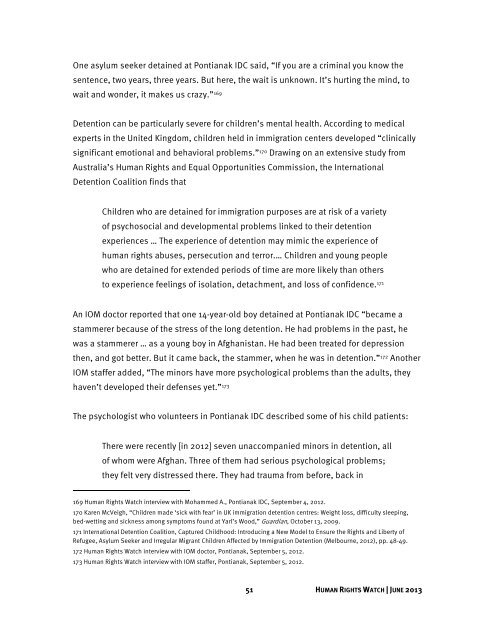Download the full report - Human Rights Watch
Download the full report - Human Rights Watch
Download the full report - Human Rights Watch
Create successful ePaper yourself
Turn your PDF publications into a flip-book with our unique Google optimized e-Paper software.
One asylum seeker detained at Pontianak IDC said, “If you are a criminal you know <strong>the</strong><br />
sentence, two years, three years. But here, <strong>the</strong> wait is unknown. It’s hurting <strong>the</strong> mind, to<br />
wait and wonder, it makes us crazy.” 169<br />
Detention can be particularly severe for children’s mental health. According to medical<br />
experts in <strong>the</strong> United Kingdom, children held in immigration centers developed “clinically<br />
significant emotional and behavioral problems.” 170 Drawing on an extensive study from<br />
Australia’s <strong>Human</strong> <strong>Rights</strong> and Equal Opportunities Commission, <strong>the</strong> International<br />
Detention Coalition finds that<br />
Children who are detained for immigration purposes are at risk of a variety<br />
of psychosocial and developmental problems linked to <strong>the</strong>ir detention<br />
experiences … The experience of detention may mimic <strong>the</strong> experience of<br />
human rights abuses, persecution and terror.… Children and young people<br />
who are detained for extended periods of time are more likely than o<strong>the</strong>rs<br />
to experience feelings of isolation, detachment, and loss of confidence. 171<br />
An IOM doctor <strong>report</strong>ed that one 14-year-old boy detained at Pontianak IDC “became a<br />
stammerer because of <strong>the</strong> stress of <strong>the</strong> long detention. He had problems in <strong>the</strong> past, he<br />
was a stammerer … as a young boy in Afghanistan. He had been treated for depression<br />
<strong>the</strong>n, and got better. But it came back, <strong>the</strong> stammer, when he was in detention.” 172 Ano<strong>the</strong>r<br />
IOM staffer added, “The minors have more psychological problems than <strong>the</strong> adults, <strong>the</strong>y<br />
haven’t developed <strong>the</strong>ir defenses yet.” 173<br />
The psychologist who volunteers in Pontianak IDC described some of his child patients:<br />
There were recently [in 2012] seven unaccompanied minors in detention, all<br />
of whom were Afghan. Three of <strong>the</strong>m had serious psychological problems;<br />
<strong>the</strong>y felt very distressed <strong>the</strong>re. They had trauma from before, back in<br />
169 <strong>Human</strong> <strong>Rights</strong> <strong>Watch</strong> interview with Mohammed A., Pontianak IDC, September 4, 2012.<br />
170 Karen McVeigh, “Children made ‘sick with fear’ in UK immigration detention centres: Weight loss, difficulty sleeping,<br />
bed-wetting and sickness among symptoms found at Yarl’s Wood,” Guardian, October 13, 2009.<br />
171 International Detention Coalition, Captured Childhood: Introducing a New Model to Ensure <strong>the</strong> <strong>Rights</strong> and Liberty of<br />
Refugee, Asylum Seeker and Irregular Migrant Children Affected by Immigration Detention (Melbourne, 2012), pp. 48-49.<br />
172 <strong>Human</strong> <strong>Rights</strong> <strong>Watch</strong> interview with IOM doctor, Pontianak, September 5, 2012.<br />
173 <strong>Human</strong> <strong>Rights</strong> <strong>Watch</strong> interview with IOM staffer, Pontianak, September 5, 2012.<br />
51 HUMAN RIGHTS WATCH | JUNE 2013
















